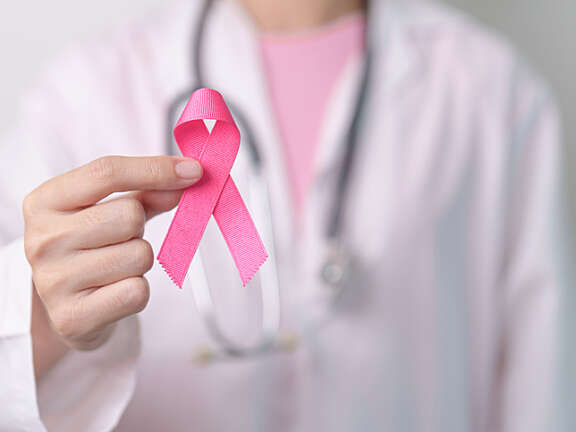Breast Cancer: Risk Factors, Symptoms & Screenings


Breast cancer is a topic that touches many lives. Statistically, one in eight women will face a breast cancer diagnosis in her lifetime.
Most breast cancers grow slowly, often taking up to 10 years before you even notice a lump. Yet, if left undiagnosed and treated, cancerous cells can spread to other parts of your body.
The good news is that with timely breast cancer screenings you can catch breast cancer in its earliest, most treatable stages. In fact, thanks to advancements in screenings and treatments, mortality has decreased significantly, with only a 2.5% chance of any woman dying from breast cancer.
What Is Breast Cancer?
Breast cancer occurs when the cells in the breast divide and grow abnormally, forming a tumor. About 80% of breast cancers first form in the milk ducts.
There are two main types of breast cancer. Non-invasive breast cancer, like ductal carcinoma in situ (DCIS), means the abnormal cells are still in the milk ducts and haven’t spread. If not treated, it can become invasive breast cancer, where the cells spread to nearby tissue.
If the cancer spreads to other parts of the body, like the bones or lungs, it’s called metastatic breast cancer, which is the most serious stage.
Breast Cancer Risk Factors
When it comes to breast cancer, knowledge is power. Knowing which risk factors can impact your health helps you and your health care provider to develop the right breast cancer screening plan for you. Plus, it allows you to modify the risk factors you can control.
Here are the key risk factors to consider.
- Age: Breast cancer risk increases beginning at age 40 and is highest in women over 70.
- Family History: A family history of breast, ovarian or prostate cancer can raise your breast cancer risk.
- Alcohol Consumption: Women who have two to three drinks daily have a 20% higher breast cancer risk than nondrinkers.
- Weight: Being overweight or obese after menopause can raise your breast cancer risk.
- Physical Activity: Women who exercise regularly have a 10% to 20% lower risk of developing breast cancer than those who are sedentary.
- Hormone Therapy: Using hormone therapy during menopause may elevate your risk.
- Smoking: Smokers who have kept up the habit for more than 10 years have about a 10% higher risk of breast cancer than nonsmokers.
- Breast Density: If your mammogram shows you have dense breasts, you could be at higher risk of developing breast cancer.
- Height: Taller women have a slightly higher breast cancer risk, which may be caused by higher levels of hormones during growth spurts in your youth.
- Previous Radiation: If you've had chest radiation for another cancer, that can raise your risk.
- Reproductive Choices: Women who have not had children or have not breastfed may be at higher risk of developing breast cancer.
Things That Won’t Raise Your Breast Cancer Risk
When it comes to breast cancer, there’s a lot of misinformation floating around out there. In fact, you may recognize some of these from social media.
Factors that that won’t increase your breast cancer risk include:
- Using antiperspirants
- Wearing an underwire bra
- Having breast implants
- Experiencing an abortion or miscarriage
- Being left-handed
- Having migraines
- Eating sugar
- Experiencing an injury to your breasts
Recognizing Breast Cancer Symptoms
It’s important to know your own breasts. If you notice any of these signs and symptoms of breast cancer, you want to contact your health care provider right away to get them checked out.
- A lump or mass in your breast
- Swelling in the breast, even if you don’t feel a lump
- Red, dry, dimpled or textured skin on your breast
- Pain in your breast or nipple
- A nipple that’s turning inward
- Discharge from your nipple
- Swollen lymph nodes under your arm or collarbone
Breast Cancer Screenings
Catching breast cancer in its earliest, most treatable stages is important. One of the most powerful ways to detect breast cancer is with a mammogram, which is an imaging of the breasts.
For women ages 40-54 at average risk, the general recommendation is to get a mammogram (breast imaging) every 1-2 years until age 74. If you are at higher risk, your health care provider can lay out a screening plan and frequency based on your unique risk factors.
Where Can I Get a Mammogram Near Me?
We make getting a screening easy and convenient. In Houston, we partner with The Rose to offer mobile mammography screenings at all Houston-area locations. In Dallas, we partner with UT Southwestern to bring mobile mammography units to our four Dallas-area locations.
